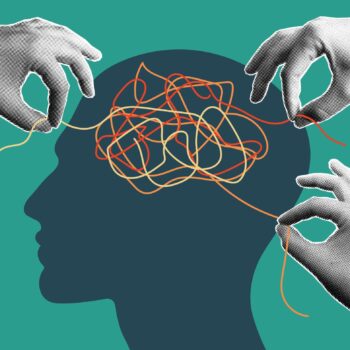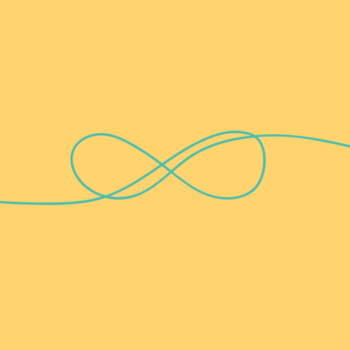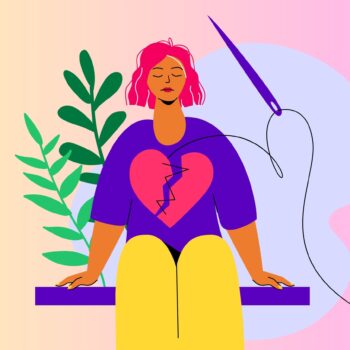When Grief Feels Ugly, Mean & Messy
/ General : Litsa Williams
The What's Your Grief Podcast: grief support for those who like to listen.

In this grief podcast, Eleanor Haley, MS and Litsa Williams, MA, LCSW-C, the mental health professionals behind the website and book 'What's Your Grief', leave no stone unturned in demystifying the complicated and messy world of living life after loss. One digestible topic at a time, Haley and Williams distill topics ranging from grief theory to coping. Grief is sad and confusing, but your grief support doesn't have to be. You can listen here by using the player above or listen and subscribe wherever you get your podcasts.
Below we have provided a transcript of the episode.
Episode Transcript
Hey everyone. Welcome back to another episode of the What's Your Grief Podcast. We are coming to you from a very rainy Thursday. It's definitely starting to feel like fall. Like, cold fall. Like it's almost winter. Almost daylight savings fall, would you agree?
I would agree, even though I like looked hopefully at the weather and realized it was, it's hopefully going to, we're going to get a little bit more sun because it does feel like dark winter fall today.
It does. And (and) anybody who doesn't know, neither Litsa or I are huge fans of the winter time. So…
No. No. I might have said this last week already that I already got my sad lamp out. I dug it out. I was like, I feel winter's coming, I'm gonna get my sad lamp out, I'm gonna start getting ready for, yeah, getting ready for it.
Matt, my husband, interestingly over the last like two (two) and a half weeks, has come home from Walmart on, I would, I am not kidding you when I say three different occasions, with one to two giant blankets. Like (like) you know, blankets for the living room, I don't know. We (we) call softies. We called them softies in our house because someone else we knew called them that, we were making fun of it. But then we like started calling it that. So he's come home with like six different softies from Walmart. But I have to tell you, they're really nice. So if anybody's looking for some new throw blankets, Walmart has some really good quality ones. But anyways, I'm like you are definitely getting ready to hibernate for the winter.
Yes. I think that's how the weather has been. It's like that moment where you're, it's still (it's still) been nice some days but then you just tell it's like hanging over everyone's head that it's (it's) going to turn soon. And everybody wants to be ready for it. I had the same thought. I was like not just with throw blankets but with, just my house in general, I was like Oh I need to like get certain things situated. That I feel like, I was bringing in my plants from outside to inside because that we've had some nights that have been cold enough that it feels like it's time to do that. And I was like Oh my house is just starting to feel more like my winter house instead of like my summer house.
How to survive the winter period but also when you're grieving is definitely, I think we've done a podcast about it before but definitely one that we need to do again this year. Maybe in a a couple weeks.
Yes. Oh my gosh, I think we definitely should. Because I think that winter, I mean it's interesting though another friend, like Luca, I was talking to Luca, a friend and she was saying, Luca like really loves the cold and the winter and thrives at that time of year. And they're really like looking forward to that. And it was just so funny because for me, I feel like it's so hard for me, even to relate to that. Like, I know that's true for some people, but it's so far from my experience.
Yes. I agree. I know some people love the winter. And I, I'm (I'm) envious. I wish (I wish) I love the winter. And I (I) know also, like we've had this discussion about different seasons of (of) grief. Like, if (if) grief happened over the summer then you maybe really prefer the winter or the fall and things like that. So we know that, you know, just the time of year can have a big impact on people in general. So, bigger (bigger) conversation for another day probably. But one thing this does make me think of, actually something I've been talking about this morning with some of our community on Facebook is the fact that Halloween is just around the corner. Are you, Litsa, I don't know if I've ever asked you, are you a Halloween person?
I mean that's a good question. I (I) would say, I mean my house isn't decorated or anything. I'm not like that all in, I like Halloween though. I used to like it more, I think it's funny. I don't, as somebody who doesn't have kids, like when you get to a, when you get to a certain age, when you're a woman of a certain age, doesn't have kids, it's like kind of weird. You're in that zone where you're like Oh wait, I'm not in like my 20s anymore where I'm going out to a bar on Halloween, and I also don't have kids so I'm not like getting dressed up with them on Halloween. But I do like Halloween. I like Halloween season. I like when kids come trick-or-treating. So overall I like Halloween, I just don't have any good excuses to kind of get into Halloween anymore.
Right. I mean not that you need excuse, if you like Halloween you can go, you can be that lady. That's true. I could be that (I could be that) lady. If your kids need anybody, if you're, if Agnes needs someone to take her trick-or-treating, I'm in. But you're right. I don't need an excuse.
Yeah. I think I'm, I maybe have said this in the past somewhere on the site or (or) not, I think fall in general is not my favorite season. I (I) actually, like, love fall in theory but my mom died October 23rd and so it's always kind of rough around the October time. Fall just happens to be one of those seasons too that has so many, like, sensory elements to it. Just the sight of it, even the smell is different in the air and the crispness and all that. And so it's, like, so hard to detangle those things from my experiences with my mom dying. You know, being really sick and then everything that came after that. So I've never, like, loved the fall since (since) that time of my life. And I don't love Halloween. Like, as a kid I liked Halloween, but as a grown-up it just feels like a lot of effort. And I feel terrible about that. Like, it makes me feel bad but I don't love, you know, making Halloween costumes and things like that. I just don't love it. Like, for (for) all those reasons. And so, I was asking on Facebook today because I know that a lot of people have similar griefy type reasons for not liking Halloween. And on the the other hand, a lot of people love Halloween because it connects them to their loved ones. So I just put it out there, I was curious. And we did receive a wide range of responses. Like, I think we would have expected a lot of people did say like Oh my (my) son loved Halloween. He loved to like scare all the kids who came to the door. And he always put on spooky sounds. Or, and so I still really enjoy doing those things. It's a way for me to remember and connect. And so there were a lot of people who had those really fond memories and fond connections that they like to carry forward. But then there were a lot of people who said Well my loved one loved Halloween. And so it now still feels very painful to me. And then a lot of people also say that some of the decorations that they never really thought twice about in the past, now feel very off-putting and kind of dark and macabra and different things bring up different feelings thoughts and emotions for people. But, yeah, some of those (some of those) decorations are feeling a little bit off for a lot of people.
Yeah. A number of years ago, you know, starting to work in grief was really when I first heard people start to talk about this idea that Halloween decorations could feel really off-putting for them after their loss. And I remember really well, I think this (this) was years ago now, but I think it was on in one of our social media communities, somebody shared that she really, growing up as a kid, her family, you know, I think she hadn't had, she just hadn't gone to cemetery. Basically long and short. She never had reason to go to a cemetery until the par-, I can't remember if it was her husband or who it was that died. Like, but until that happened, like, that was the first time she ever went to a, really into a cemetery. She was like Obviously I'd driven by them, but like, and then when Halloween rolled around, she suddenly like seeing all these kind of like fake cemetery. Like head to headstones out in people's yard. It like, really took her aback a lot more. And she was like I'd never like given it a lot of thought, but she's like I think all of a sudden, because going to the cemetery for the first time in such a significant way was had such an impact on me, that then seeing people just having decorations that are like a cemetery in their yard felt really really weird. And it was interesting because I'd never considered that before. I kind of had the opposite experience because I was raised in a family where, like, I was getting taken to the cemetery from before I could walk. Because my family just always did that and involved kids. I'd never given it a second thought. But it made so much sense when she described her experience, that of course that has an impact. And then you suddenly start to see things differently because of your own experience.
Yeah. For sure. In ways that you probably didn't anticipate or didn't realize, like you said, she was kind of caught off guard by that. But now, all of a sudden, can see why somebody would (would) feel that way. And I think what we really wanted to talk about, it's kind of a (kind of a) hard transition but it's, it has to do with this, is just the fact that there are a lot of times when in life we feel a little bit disconnected from what's going on around us, in a way that we feel like maybe everyone else is is celebrating and we aren't. Or in a way that we feel like Oh we should be feeling happier, more positive, more merry with things like Thanksgiving coming up, more grateful with things like the other December holidays coming up. Maybe feeling more merry or more generous of spirit and all sorts of things. And it makes me think of the list that we first wrote on our website, and that is now in our book, and it's the list is called "Eight Feelings That Can Make Grief Ugly, Mean or Messy".
Yes. And you know I think it's (it's) interesting, because there's, as you were describing the holidays and how we can feel like we should feel this or we should feel that because that's what the season's all about, I think part of what can make us feel mean is sometimes the feeling, a feeling like jealous that we don't feel it like we see it in other people.
Yeah.
And we're looking at them and we're like beyond the Oh, It should feel merry. It's like this jealousy or sometimes like even resentment that other people around us are able to just enjoy the holiday season and not have this huge weight hanging over them of grief. Or they're able to put those Halloween decorations out without a second thought because they haven't experienced something that now has created an association that is really hard and upsetting and sad. And so I think, for me one of the things that's on that list that I think is so common but that we don't talk about that much is that we feel jealous of people when they're getting to experience the season in the way that we feel like we should be able to experience the season or we're supposed to.
Yeah. And I think one thing to point out, actually what we, how we wrote this point when we wrote it in the book is that you feel jealous of people you love. Like, you feel jealous of people in general but I do think it's also important to point out that you might feel jealous of people who you want to be happy for. You know, who you love, who you have just the greatest hopes for, and want their every happiness but at the same time you feel a little bit jealous or bitter because of your particular loss. I think of this sometimes when I think about how people might struggle with infertility or experience miscarriage and still birth and have family members who they want the best, or who they love very much, you know, announce things like pregnancy or (or) have a baby shower or have a baby. And you want (you want) them to be happy, you're happy for them, but at the same time it can be really hard to separate out feelings of, you know, jealousy or (or) bitterness or resentment. Those are very natural and normal feelings. It doesn't mean that you don't want your loved one to be happy but it also means that you have your own feelings about your own life.
Yeah. And that you can feel, I mean you know, I feel like we're a broken record sometimes with the, like, and you can feel them both at the same time. But it's true. Like you can feel them both at the same time. You can truly want someone to be happy and you can be happy for them that (that) they're happy and you can also feel jealous, and you can also feel like it's unfair, and you can also feel all of those things. And one doesn't have to be taking away from the other. I think that's part of the thing that's hard for people is it feels like I'm ashamed of this because somehow I must not be fully happy for my friend if I also feel jealous of my friend. But in many, you know, I think about these situations and it, with other people, I would certainly understand. If I was in that position and somebody saw me getting to experience Mother's Day with my mom and they had lost their mom. Like, I would absolutely understand that in that moment they could both feel so happy that I get to have Mother's Day with my mom and kind of jealous and resentful that they don't get to have Mother's Day with their mom. And you know, those can both be 100% true.
Yeah. It's (it's) almost like, I think needing to, for me personally, because the example you just shared is spot on for me. I think it's me needing to separate out feeling resentment towards the person or and just resentment towards my loss. It's not the person who has the mother that I am resentful of. It is the fact that I don't have my mother. It is the loss. It is the course that her life took that I feel resentful of. And so I think, for me, being able to separate those things out and distinguish those is really important. But what we know in loss is we often displace our feelings onto the world around us, you know. We can't get mad at loss. We can't take it out on loss because loss is abstract. But we can get mad and take it out on people around us. So I do think that often times, not just with jealousy but another thing that we talk about in this list is feeling very angry. And I think a lot of times with that anger we can easily find ourselves taking out the anger on things that aren't necessarily appropriate places to take out the anger.
Yeah. And I think sometimes, you know, (it) it's interesting I was about to say something that (that I'm), I'm pausing to rethink because I don't think it's always true, I was about to say, you know, you wouldn't want your friend not to be happy, not to experience that (that) happiness just because you are not getting to experience it. But interestingly, I think that, I know that from talking to many people in grief over many years, that sometimes people will even say I wanted someone else to not be happy, because (I) I haven't had that happiness. Or because I was hurt in some way. And when you dig below that, when you talk to people about that, often, you know, what you get to is people feeling alone and isolated and kind of, like, angry that no one else, they feel like no one else either understands what they've been through or has had to go through what they've been through, and sometimes there's this anger that it happened, but also anger that you're alone and misunderstood. And sometimes kind of looking for a certain connection. So there can be that feeling of like, you know, I'm (I'm) angry and I wish that this other person, I wish I could feel connection, you know, in this way. And often times when people are feel that they take a step back and they feel awful afterwards that they feel like they've wished it. But often what they're looking for is like, I wish somebody could understand. I wish I didn't feel alone. I wish I had, you know, a connection around this. And when they spend a little time they don't really want other people to (to) suffer, but they also want to feel less alone. And a lot of this anger…
Yeah.
…is per, you know, is (is) surrounding a lot of those other feelings.
Yeah. I just had somebody who I'm close with, who struggles from time to time with pretty extreme depression and anxiety, say to me I wish that others could see what my life is like through my eyes. Like, I wish others could just be in my brain for, you know, one day or one hour. And I think that that sort of expresses like what you're saying. Like, it's not necessarily that I want you to have the same loss or hardship that I had, but I just wish that you could see the world how I'm currently seeing it so you could understand me better. And (and, and) so that I'm not feeling like everyone else is on the inside and I'm the only one standing alone on the outside. So it (it) comes from a place, probably for many people, I can't speak for everybody, but for many people it comes from a place of just wanting connection. Just wanting to be understood, maybe heard or not alone. So I feel like it has you know pretty pure intentions. But the way it sometimes comes out in the world can make us really question ourselves and feel bad about something that comes from not a bad place.
Yeah. I think that's exactly, I think that's exactly it. And I think that when we're very aware that other people are seeing the world differently than we are or they can't connect to us or relate to us, you know, one of the other things that we we included on this list was feeling judge, judgmental. Judging other people around us. Being critical of other people around us. And I think sometimes it's because in grief, with that, we feel like we have sort of seen things that other people haven't seen. Like, we understand priorities differently. We suddenly feel like there's a weight to the way that we're experiencing the world that others don't have. And suddenly the things that the (the) lens they're looking at the world with stuff feels important to them, that to us is just like Are you serious? Like, don't you know what's really important in the world? Like, I've lost the person that's the most important to me or I've found out I'm never going to be able to have children or I've, you know, found out that whatever this huge thing is that has changed in one's life, it can then just feel so frustrating when somebody is complaining about the fact that their favorite Starbucks location closed, or you know whatever it is that is (is) their weight. And so we have this judgment that comes. And I think, again, it's that I just wish you could see the world through my eyes. I wish you could understand what I'm seeing and how my priorities have shifted. And we can't snap our fingers and have people do that. And as a result, sometimes, it's hard because we do I find myself having to keep myself in check sometimes when I feel like people are getting worked up about stuff that in the grand scheme of things feels inconsequential, and I realize that sometimes that comes from the fact that I both have personal and professional experiences that sometimes keep my priorities in a different place than other people's priorities.
Yeah. Sure. I think that grief often causes a little bit of a disenchantment with a lot of things in life. It can cause you to change your beliefs, your outlook on things. Sometimes I think about, like think about times when you've maybe been going through a breakup or something like that, when all of a sudden you see people Oh you're getting married? Oh great. Whatever, love sucks, you know. Like, it's all of a sudden you just don't see it like that anymore. You see how bad it could be or you don't believe in it. And so, you know, you see in the world around you and you just can't maybe buy into it or feel the enthusiasm for it in the way that she would have in the past. And some people are pretty good, it's like thinking it and not saying it. But some people, especially when you're feeling like really worn down, really emotionally raw, sometimes it slips through the filter a little bit. And so, we can have moments when we're grieving like there are plenty of times where I think, I personally feel like I was an [ __ ], you know.
Yes.
In it quite a few times. Just because I was feeling like crap and I wasn't thinking about the people around me. And I was letting things slip through the filter. So I do think, like, as much as sometimes people can be a little insensitive in the things that they talk about around you, or you were talking about, like, people talking about worries that seem kind of trite in comparison to bigger losses and things like that. I do think sometimes just, we're just not at our best when we're grieving and we do things and then we wish we didn't, you know.
Oh, absolutely. I think that we're so much of our baseline energy in grief. It's being spent just like sometimes trying to survive get through the day, figure out how to manage these new emotions that we're having and take care of logistics in the world and all that. And sometimes the added energy that is required to keep our filter in place and to extend kindness or empathy or compassion or what we're expending so much energy on just surviving and getting through the day and figuring out how to live in the early days of grief or even the later days of grief that it's sometimes very hard to keep that in check. And you do end up sometimes having to apologize to people and say like sorry it's (it's) not you, it's (it's) my grief.
I like that. It's not you, it's my grief. Not. You're kind of under (under) the influence of grief a little bit.
Exactly, exactly.
I think one thing that you said reminds me of another one that I think can make us feel bad about ourselves and that's just the sense that you don't care about things the way you used to. And I'm not, this, I'm not saying this in the way that we kind of just talked about which is like you're you're a little bit judgmental or resentful or mad, it's that you just really don't care. And you're not really keeping the balls in the air the way you had in the past with these things, because you don't have that, you know, you don't have that energy. Or you don't have that priority. Or you just frankly are feeling apathetic about everything. And even though you can't muster the investment in that thing, then there's always that judgmental voice in your head that's saying to you But you should be keeping up your grades at school. But you should be calling your best friend at least once a month right now. But you should be, you know, being super mom still. So I do also think that there's that part of us that's just kind of, like, feeling like a disappointment because we're not able to be operating at at full capacity. Whatever that might be for you, I think that we often will judge ourselves for the things that we don't care about or that we let slide.
Yeah. I (I) think many people can relate to that and feeling, like you know theoretically, something, you know, they almost want it to still feel important and meaningful and, you know, connection to it. But it just feels, you know, you feel disconnected, you feel disengaged, you feel numb. It just doesn't, no matter how much you want to care about it or take action around it, you can't. And that can be a really bad feeling.
You, sometime, something that we talk about a lot and that I hear a lot of people talk about, is the fact that grief changes your priorities and (and) understanding that grief might change your priorities. And I (I) think an important piece of that to talk about, maybe more than I've heard talked about, is the fact that before being able to embrace new priorities, there's often that struggle where you're trying to engage with a priority and constantly falling short or being disconnected from it. And that's a very frustrating place to be in. And there's almost this point where you have to say This is a loss I have to let go of. At least for now. And I don't know that I hear people talk enough about that struggle that comes before that Oh I need to embrace new priorities and new direction in my life. Not everybody's going to engage in that but I can definitely think of times when I have and I've definitely talked to people who've had that push and pull between I'm trying to continue to be fully engaged in this this priority that I used to have or this responsibility or this relationship that I used to have and it's just not working and I'm constantly feeling frustrated and bad about myself.
Yeah. And it (it) really is. You're right it's this, the, there's the loss with it and there's also, I think sometimes where can be helpful to remember that, yes, some priorities change forever. But oftentimes something is just it's temporary. Like, and sometimes it's okay to give yourself that self-compassion or that permission to just say You know what, like, this is not something I feel connected to right now, and that's okay. I'm allowed to take space from it. Acknowledge that there's a feeling of loss that I don't, that I'm not feeling as invested or connected or whatever. But rather than in beating myself up, and feeling like I'm failing over and over again even when I'm pushing myself, is to just say I'm just going to take some space from this. And maybe in a little while, I'll feel reconnected again. And it'll be different, maybe not, but like right now I just need to focus my attention where I am feeling more engaged.
One of the last ones that comes to my mind is when we're feeling a little bit out of control, looking for coping to help us take steps. And I think, we might feel like we can't find any sort of coping, we can't find any sort of mastery, we can't find any sort of balance, or it might be a feeling that the coping we're going to is actually really negative coping that's making things worse.
You know, I think this one, I think everyone in grief, I mean, I (I) don't know that I've ever talked to anyone grieving, any sort of loss that hasn't had that moment of feeling out of control in some way. Where that I think our sense of mastery in the world, like, we often times, even if it's just one area of your life where it's like Okay, well at least at work I feel like I'm able to come in and get my job done and focus. Or I'm able to be a really good mom and do these particular things. Or I'm always able to be a kind caring empathetic person, like, we have these things that we've worked over the course of our lives to really develop and feel comfort in and feel like are part of who we are. And I think that can really tail spin in grief where all of a sudden the job you felt like you were great at you get into work and you're like, I cannot concentrate to finish a task. I'm snapping at people at meetings. I'm so, you know, and suddenly you're like, I don't even know where to begin to get back on top of this. Like, this is something that came naturally to me before and I can't even figure out now how with work or you know with effort to get it back under control. And so I think that feeling it's incredibly common and it is one that a combination of support and time and cope, you know. Working sometimes with someone, a therapist, or you know, to try to figure out how do I (how do I) start to slowly feel a little more in control. And if negative coping is something that has crept in and is become my go-to, if I'm not able to get rain that in on my own and say Okay, I've got to find some other coping skills, that getting professional support can be really important with this one, because spiraling, there is, you know, there is not much worse on top of grief which is all of (of) feeling like you're spiraling out of control on top of everything else with your grief.
Well, I referenced our book at the beginning, I didn't share what it's called with you so I will right now. It's called What's Your Grief, List To Help You Through Any Loss and that's available anywhere you buy books other than I'm not sure about your local bookstore so check with them first. And also our website is www.whatsyourgrief.com for hundreds of articles about grief and coping and life after loss. And then we have some other communities that we will share in the episode notes.
We wrote a book!
After writing online articles for What’s Your Grief
for over a decade, we finally wrote a tangible,
real-life book!
What’s Your Grief? Lists to Help you Through Any Loss is for people experiencing any type of loss. This book discusses some of the most common grief experiences and breaks down psychological concepts to help you understand your thoughts and emotions. It also shares useful coping tools, and helps the reader reflect on their unique relationship with grief and loss.
You can find What’s Your Grief? Lists to Help you Through Any Loss wherever you buy books:




